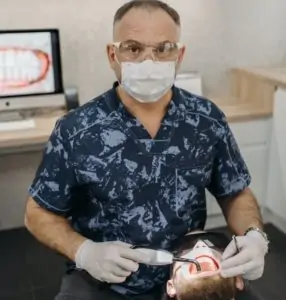
Acid & Sugar
Fruit, while healthy and powerful in fueling our bodies, also naturally contains sugar. As everyone knows, sugar isn’t a friend of your dentist in Asheboro. You see, when we eat foods with sugar, we essentially feed the bacteria in our mouths. As a result, these bacteria produce an acidic byproduct. The acid can wear down tooth enamel and leave teeth more susceptible to decay and other problems. Some signs of tooth enamel erosion include:
- Increased Tooth Sensitivity
- Cracking Teeth
- Tooth Discoloration
- Transparent Teeth
Schedule an appointment with your dentist in Asheboro if you suspect enamel erosion.
Should You Forego Fruit?
In short, fruit is a necessary part of a healthy diet and you shouldn’t pass on it simply because there are minor risks to your oral health. However, there are things you can do to reduce the potential negative side effects of fruit.
- Choose Wisely
When selecting a piece of fruit to enjoy, consider those that contain a lot of water. Fruits like apples, pears, watermelon, and cantaloupe are all great choices.
- Enjoy in Moderation
There are also some types of fruit that you can enjoy but should do so in moderation. Citrus fruits and sour fruits, such as grapefruit, lemons, limes, and pineapple are both sugary and already acidic, making them more likely to cause enamel erosion
- Pass on the Juice
Drinking fruit juice may seem like an easier way to get the benefits of fruit without the hassle of eating fruit. But be wary. Fruit juice usually contains higher amounts of sugar and can coat your teeth easily.
- Rinse with Water
After you eat fruit or drink fruit juice, we recommend rinsing your mouth out with water. This can help wash away sugars and neutralize acids.
Remember, your diet is a key part of your oral health and you should eat well-balanced meals, including fruits and vegetables. Additionally, make sure you brush and floss your teeth every day and see a dentist near you at least twice a year.





 Dental insurance can be a good thing to have, but the benefits don’t last forever. If you have dental insurance, there’s a chance that it’s going to expire at the end of the year. Unfortunately, many people let their benefits sit unused. However, there are several good reasons why you should see your
Dental insurance can be a good thing to have, but the benefits don’t last forever. If you have dental insurance, there’s a chance that it’s going to expire at the end of the year. Unfortunately, many people let their benefits sit unused. However, there are several good reasons why you should see your  Your teeth are an important part of your body, so it’s normal to be concerned about how wisdom teeth extraction will affect you, especially if you’re not used to dental procedures. After having your wisdom teeth removed, it’s important to follow your dentist’s instructions closely so that you can recover as quickly and safely as possible. This includes avoiding some of the things that you may normally do on a regular basis. Luckily, your
Your teeth are an important part of your body, so it’s normal to be concerned about how wisdom teeth extraction will affect you, especially if you’re not used to dental procedures. After having your wisdom teeth removed, it’s important to follow your dentist’s instructions closely so that you can recover as quickly and safely as possible. This includes avoiding some of the things that you may normally do on a regular basis. Luckily, your 
 Have you been searching for ways to get whiter teeth? Do you feel as though your teeth are stained from all the coffee and wine that you drink? Well, the good news is, there are plenty of ways to reverse staining to get whiter teeth. In fact, if you follow these simple steps from your
Have you been searching for ways to get whiter teeth? Do you feel as though your teeth are stained from all the coffee and wine that you drink? Well, the good news is, there are plenty of ways to reverse staining to get whiter teeth. In fact, if you follow these simple steps from your 





